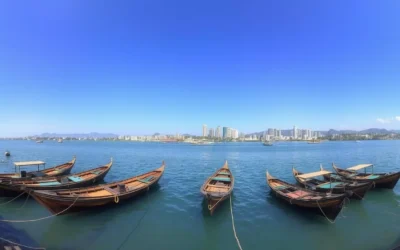Did you know that Bukit Duabelas National Park is one of the last places on Earth where you can encounter the Orang Rimba, an indigenous tribe that has lived in harmony with the rainforest for generations? This hidden gem in Jambi Province, Sumatra, spans 280 square kilometers of pristine lowland tropical rainforest and represents one of Indonesia’s most culturally and ecologically significant protected areas.
Getting There & Planning Your Journey
Reaching Bukit Duabelas National Park requires some planning, as it’s located in a relatively remote area of Jambi Province. The journey is part of the adventure and offers glimpses into rural Sumatran life along the way.
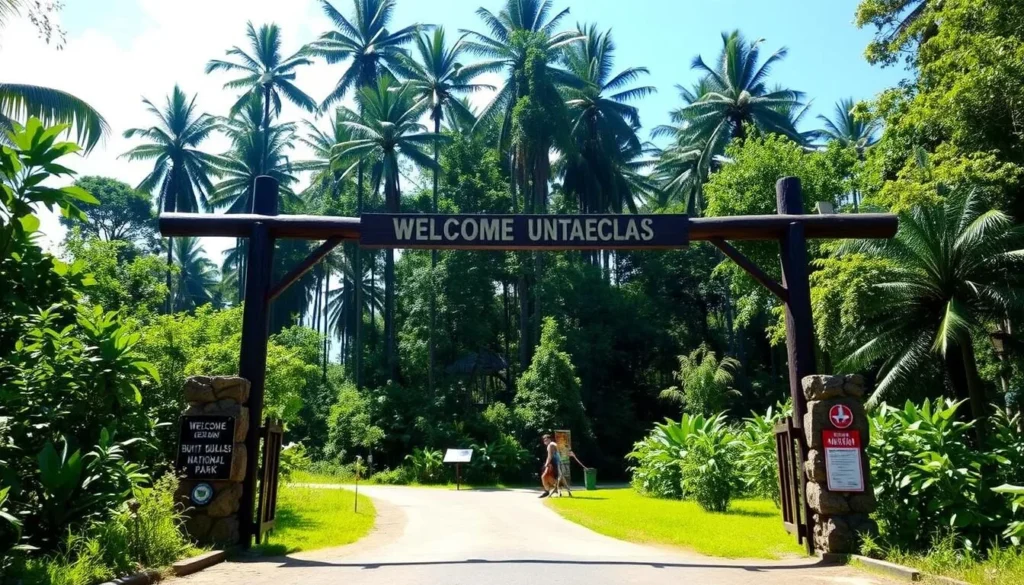
The most common route begins with a flight to Jambi City, the provincial capital. From Jakarta, this is approximately a 1-hour flight. Once in Jambi, you’ll need to travel by road to reach the park:
- Jambi to Pauh: 4-hour drive
- Pauh to Pematang Kabau: 3-hour drive
Alternatively, you can fly to Padang and take a longer overland route:
- Padang to Muara Bungo: 8-hour drive
- Muara Bungo to Pematang Kabau (via Margoyoso and Air Hitam Ulu): 4-hour drive
Ready to Start Your Adventure?
Book your flights to Jambi or Padang and begin your journey to this remarkable rainforest sanctuary.
Best Time to Visit & Weather Tips
Bukit Duabelas National Park experiences a tropical climate with distinct wet and dry seasons. The best time to visit is during the dry season from June to September, when trails are less muddy and outdoor activities are more comfortable.
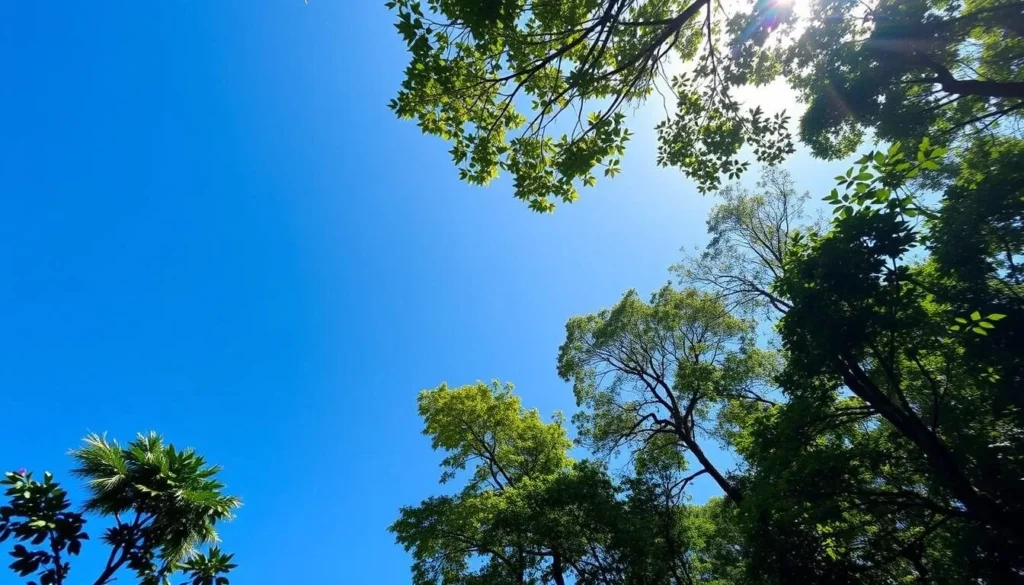
Dry Season (June-September)
- Less rainfall and humidity
- Easier hiking conditions
- Better wildlife viewing opportunities
- Average temperatures: 25-32°C (77-90°F)
Wet Season (October-May)
- Heavy afternoon downpours
- Lush, vibrant vegetation
- Challenging trail conditions
- Average temperatures: 23-30°C (73-86°F)
Traveler Tip: Even during the dry season, pack quick-dry clothing, waterproof bags for electronics, and leech socks. The rainforest remains humid year-round, and brief showers can occur at any time.
Getting Around Locally
Once you arrive at the park, getting around requires local transportation and guides. The park’s infrastructure is limited, which helps preserve its natural state but requires visitors to plan accordingly.
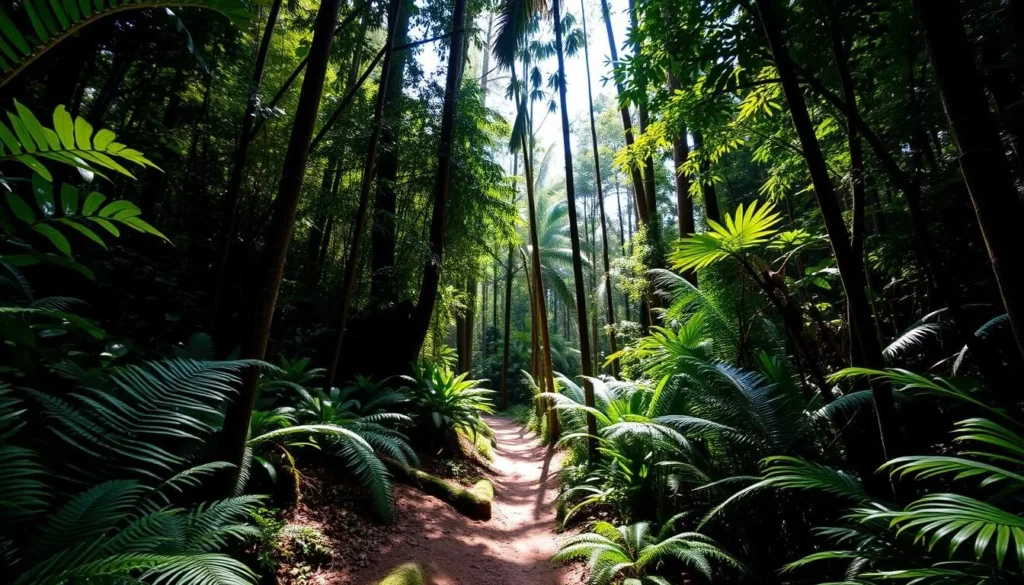
Transportation Options:
- Local Guides: Mandatory for exploring the park. They provide invaluable knowledge about the forest, wildlife, and help navigate the trails safely.
- 4WD Vehicles: Necessary for reaching certain trailheads, especially during wet season.
- Walking: Most exploration within the park is done on foot via hiking trails of varying difficulty.
- River Travel: Some areas of the park can be accessed via small boats along the rivers that cross the forest.
Explore at Your Own Pace
Rent a vehicle in Jambi to reach the park and explore surrounding areas with greater flexibility.
Important: Arrange your guide in advance through the park office or your accommodation. The Bukit Duabelas National Park office can be contacted at: tnbukit12@yahoo.co.id or visit their office at Jl. Linta Sumatera Km.4 Sorolangun Bangko, Hourbi 36124.
Where to Stay
Accommodation options near Bukit Duabelas National Park range from basic to comfortable, with most choices located in nearby towns rather than within the park itself.

Guesthouses
Simple, affordable accommodations in nearby villages like Pematang Kabau and Air Hitam Ulu. These family-run establishments offer basic rooms and authentic local hospitality.
Price range: Rp300,000-500,000 per night
Hotels in Bangko
The town of Bangko (about 2 hours from the park entrance) offers more comfortable hotel options with amenities like air conditioning and restaurants.
Price range: Rp500,000-1,000,000 per night
Camping
For the adventurous, camping within designated areas of the park is possible with proper permits. Bring your own equipment or arrange through a tour operator.
Price range: Rp100,000-200,000 for permits
Find Your Perfect Stay
Book accommodation in advance, especially during peak season (June-September).
Dining & Local Cuisine
The culinary experience around Bukit Duabelas offers a taste of authentic Jambi cuisine, characterized by its rich flavors and use of local ingredients from the forest and nearby farms.
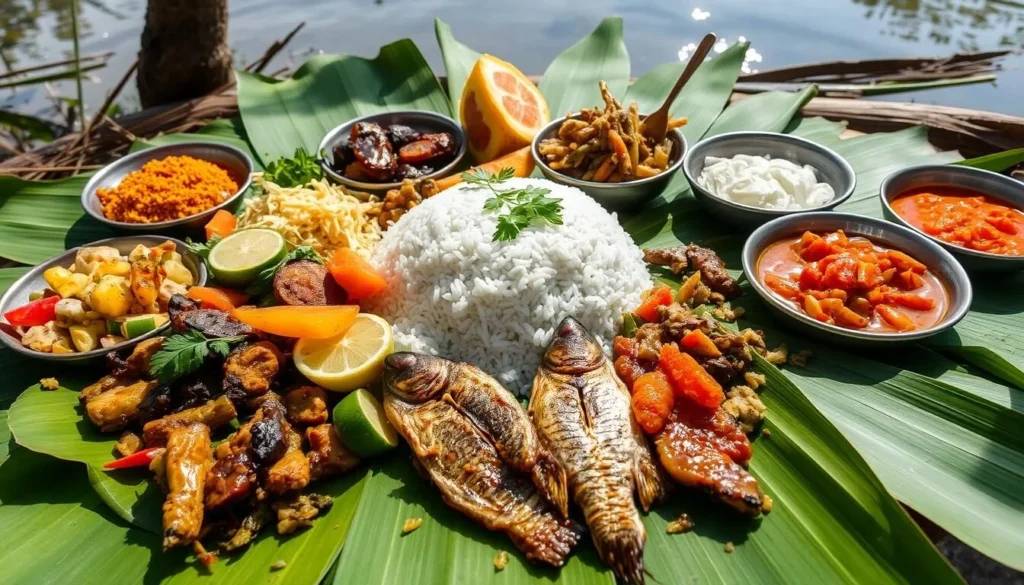
Must-Try Local Dishes:
- Tempoyak: Fermented durian paste mixed with various spices, often served with fish.
- Gulai Ikan Patin: Catfish curry cooked with local herbs and spices.
- Nasi Gemuk: Fragrant rice cooked with coconut milk and herbs.
- Sambal Tempoyak: Spicy chili paste mixed with fermented durian.
- Rendang Jambi: A drier version of the famous Indonesian beef dish with local spices.
“The food around Bukit Duabelas offers a unique glimpse into the traditional cuisine of Jambi, with ingredients that have sustained local communities for generations.”
Most accommodations offer meals, and small warungs (local eateries) can be found in nearby villages. For those camping or trekking, guides can help prepare meals using traditional methods, offering a unique cultural experience.
Attractions, Sightseeing & Activities
Bukit Duabelas National Park offers a wealth of natural attractions and activities for nature enthusiasts and adventure seekers alike.
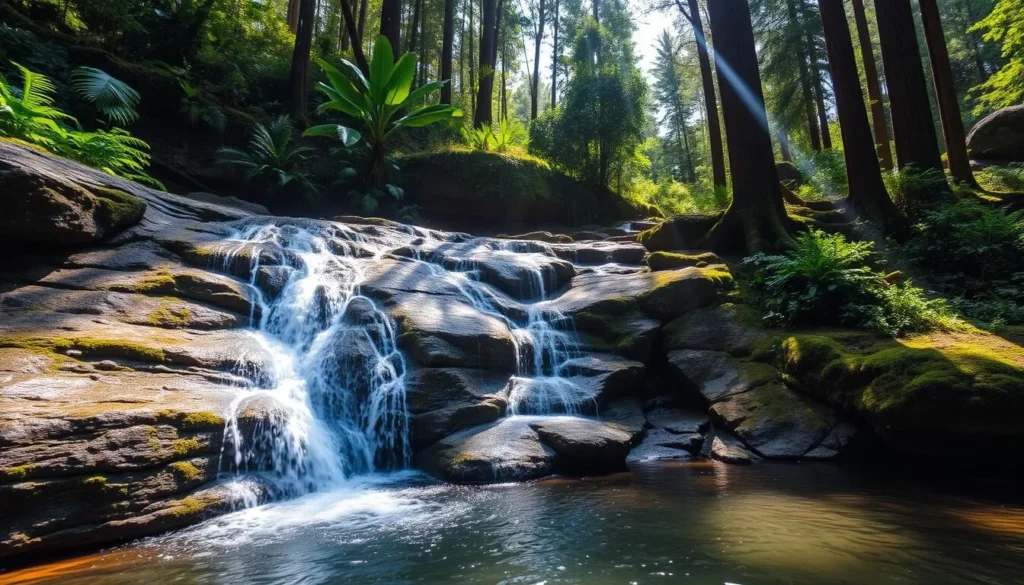
Top Natural Attractions:
Tereng Cave
Located along the Tereng River, this natural cave formation dates back millions of years. Explore its chambers with a guide and discover the unique ecosystem that thrives in this subterranean environment.
Hidden Waterfalls
The park features several pristine waterfalls tucked away in the forest. These make perfect spots for a refreshing swim after a trek through the humid rainforest.
Ancient Rock Formations
Discover fascinating rock monuments scattered throughout the park, some bearing natural inscriptions and patterns formed over centuries of weathering.
Popular Activities:
- Guided Jungle Treks: Explore the rainforest with experienced guides who can identify wildlife and explain the ecosystem.
- Wildlife Observation: Spot rare species like the Sumatran tiger (though extremely rare), clouded leopard, sun bear, and various primates.
- Birdwatching: Over 100 bird species inhabit the park, including hornbills, kingfishers, and various raptors.
- Cultural Experiences: Learn about the Orang Rimba way of life through respectful, guided interactions.
- Photography: Capture the stunning biodiversity and landscapes of this pristine ecosystem.
Experience the Best of Bukit Duabelas
Book guided tours and activities with experienced local operators for an unforgettable rainforest adventure.
Cultural Experiences & Indigenous Communities
One of the most unique aspects of Bukit Duabelas National Park is its role as home to the Orang Rimba (also known as Suku Anak Dalam), an indigenous community that has maintained their traditional forest-dwelling lifestyle for generations.
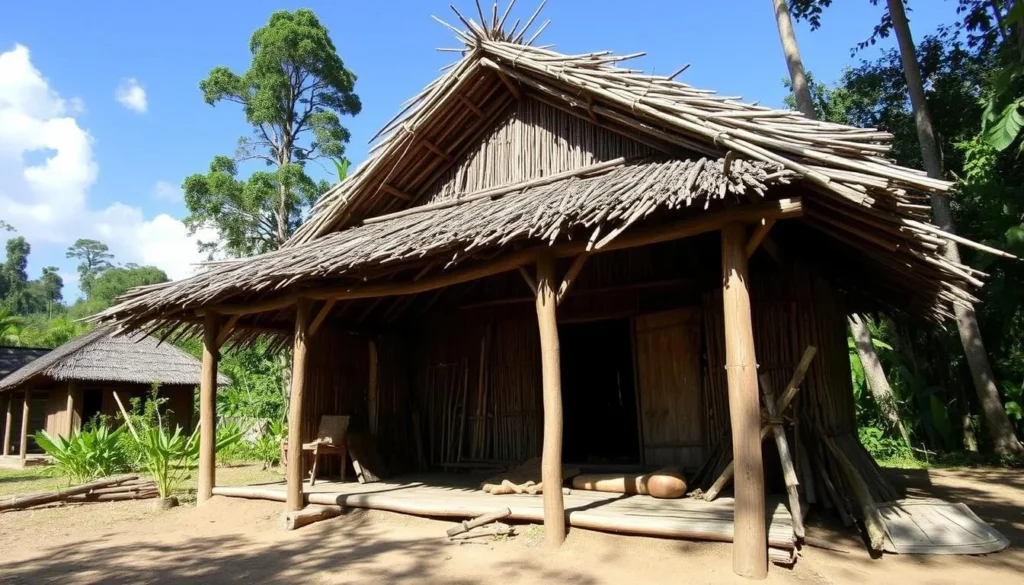
The Orang Rimba, which translates to “People of the Forest,” have developed a deep knowledge of the rainforest ecosystem. Their traditional practices and sustainable use of forest resources represent an important cultural heritage that the national park helps preserve.
Respectful Cultural Engagement:
- Visits to Orang Rimba communities must be arranged through official channels and with proper guides.
- Photography should only be taken with explicit permission.
- Visitors should follow all guidelines provided by cultural guides to ensure respectful interaction.
- Small gifts of practical items (not money) may be appropriate – guides can advise on this.
“The Orang Rimba’s knowledge of medicinal plants, sustainable hunting practices, and forest navigation skills represent an invaluable cultural treasure that offers important lessons in living harmoniously with nature.”
Some tour operators offer cultural experiences where visitors can learn about traditional forest crafts, food gathering techniques, and the Orang Rimba’s unique worldview. These experiences provide valuable income for communities while helping preserve their cultural heritage.
Wildlife & Nature Experiences
Bukit Duabelas National Park is a biodiversity hotspot, home to numerous rare and endangered species that thrive in its protected rainforest ecosystem.
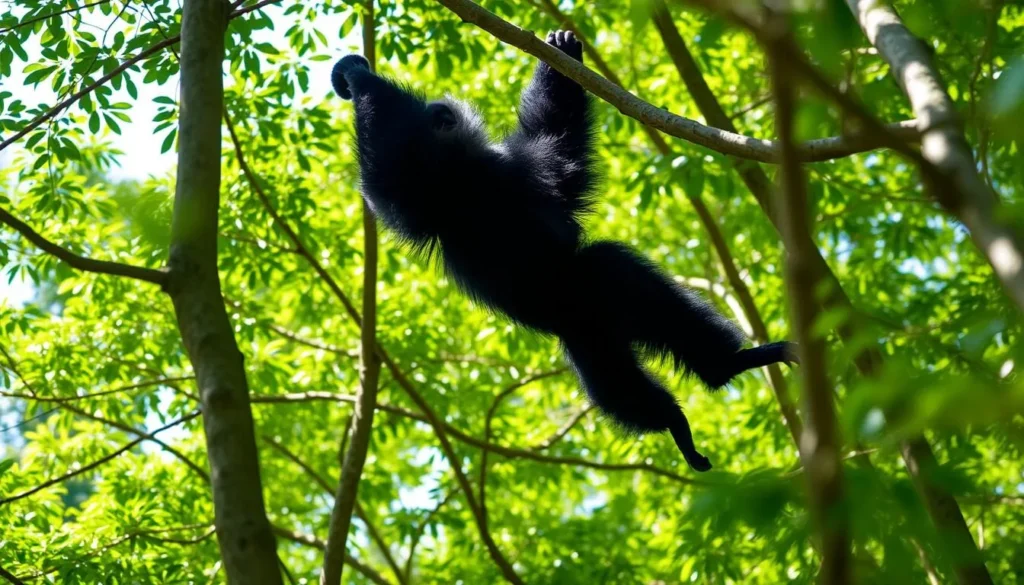
Notable Wildlife Species:
Mammals
- Sumatran Tiger (critically endangered)
- Clouded Leopard
- Sun Bear
- Siamang
- Malayan Tapir
- Sumatran Muntjac
- Leopard Cat
- Sumatran Striped Rabbit
Birds
- Rhinoceros Hornbill
- Crested Serpent Eagle
- Oriental Pied Hornbill
- Great Argus
- Banded Kingfisher
- Black-and-Red Broadbill
- Scarlet Minivet
- Buffy Fish Owl
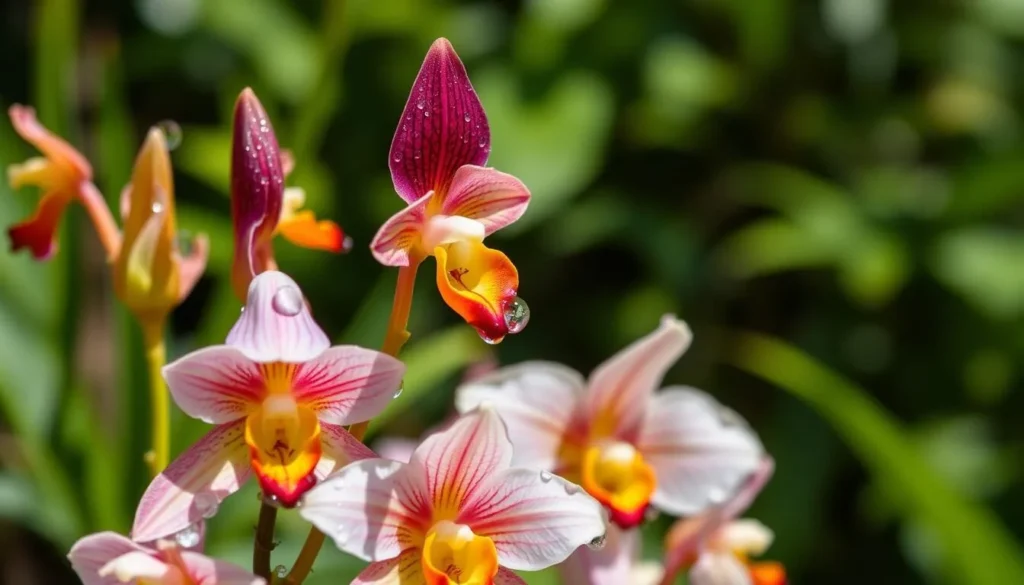
Flora Highlights:
- Over 1,000 plant species including 41 different orchids
- Bornean Ironwood trees
- Bangris
- Jelutong
- Medicinal plants used by the Orang Rimba
- Diverse ferns and epiphytes
Wildlife Viewing Tips: Animals in the rainforest are often elusive. Early morning and late afternoon offer the best viewing opportunities. Move quietly, wear earth-toned clothing, and follow your guide’s instructions for the best chance of spotting wildlife.
Safety, Etiquette & Local Customs
Visiting Bukit Duabelas National Park requires preparation and respect for both the natural environment and local communities.
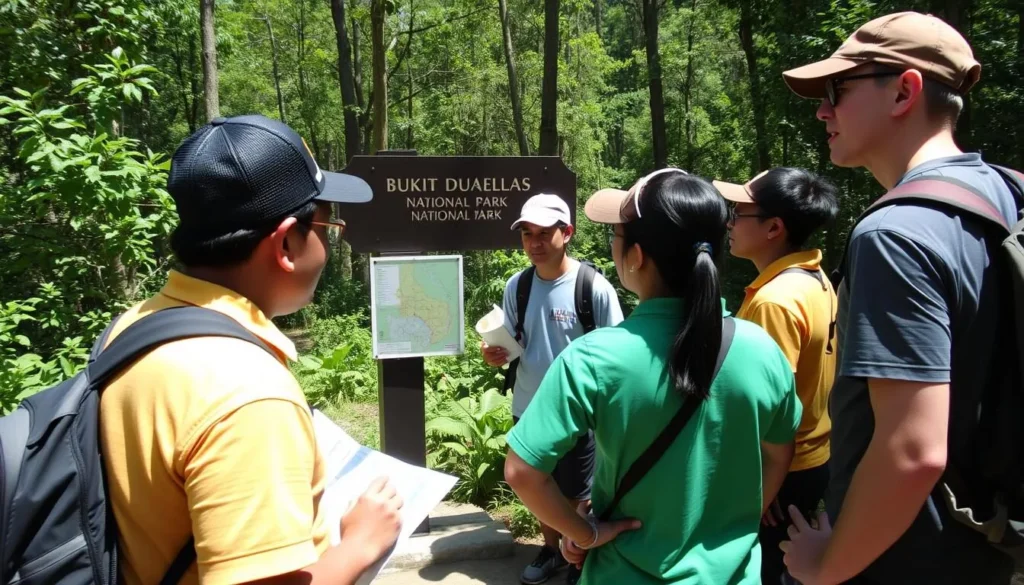
Safety Considerations:
- Always hire a local guide – they know the terrain and potential hazards
- Bring basic first aid supplies – including antiseptic, bandages, and anti-inflammatory medication
- Use leech socks – leeches are common in the rainforest
- Stay hydrated – the humid environment can lead to rapid dehydration
- Inform others of your itinerary – cell service is limited or non-existent in the park
Cultural Etiquette:
- Ask permission before photographing local people
- Dress modestly when visiting villages (shoulders and knees covered)
- Remove shoes when entering homes or certain structures
- Accept offered food or drink when possible – refusing can be considered impolite
- Learn a few basic Indonesian phrases as a sign of respect
Environmental Etiquette: Follow the “leave no trace” principle. Pack out all trash, stay on designated trails, don’t collect plants or wildlife, and minimize noise to avoid disturbing animals.
Practical Travel Tips
Make your journey to Bukit Duabelas National Park smoother with these essential travel tips.

What to Pack:
Essential Items
- Lightweight, quick-dry clothing
- Long pants and long-sleeved shirts
- Sturdy hiking boots with good grip
- Rain jacket or poncho
- Hat and sunglasses
- Sunscreen and insect repellent
- Reusable water bottle
- Basic first aid kit
Recommended Extras
- Leech socks
- Binoculars for wildlife viewing
- Dry bags for electronics
- Headlamp or flashlight
- Portable charger
- Light sleeping bag (if camping)
- Water purification tablets
- Small gifts for local communities
Practical Information:
- Park Fees: Approximately Rp150,000-250,000 per person (varies for foreigners)
- Guide Fees: Rp300,000-500,000 per day depending on group size and itinerary
- Currency: Bring sufficient Indonesian Rupiah (IDR) as ATMs are not available near the park
- Language: Basic Indonesian phrases are helpful; guides typically speak some English
- Electricity: Limited or unavailable in remote areas; bring portable chargers
- Internet: Very limited connectivity; prepare to be offline during your visit
Conclusion
Bukit Duabelas National Park offers a rare glimpse into one of Indonesia’s most pristine rainforest ecosystems and the unique cultural heritage of its indigenous inhabitants. From challenging treks through dense jungle to serene moments by hidden waterfalls, the park rewards visitors with authentic experiences far from the beaten tourist path.
While reaching and exploring this hidden gem requires effort and preparation, the rewards are immeasurable. The combination of extraordinary biodiversity, cultural encounters, and untouched natural beauty makes Bukit Duabelas a destination that will leave a lasting impression on any traveler seeking to connect with Indonesia’s wild heart.
Begin Your Bukit Duabelas Adventure
Start planning your journey to this remarkable rainforest sanctuary today.

